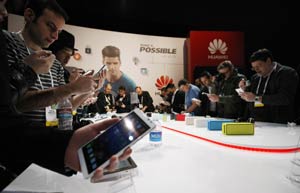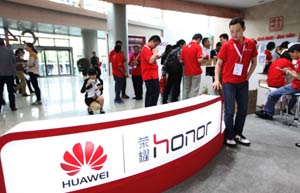"It's the first ever smartphone many Ghanaians will use, and it's very affordable.
"We don't make a profit, but we want to capture the smartphone market, to get more people to enjoy using the smartphones.
"This can stimulate development of the telecom market because more and more people use the data services, and the telecom operators can benefit from it."
While Ghana reached "lower middle income" status as a country in 2011, its annual per capita income is estimated by the World Bank at just $1,760. That means the average person cannot afford high-end technology. Accessing the Internet via a computer is out of reach for many.
"Many Ghanaians cannot afford products like laptops or tablets, and that's why we bring this kind of very affordable smartphone to them," Li says. "So they can enjoy the benefit of data services, with a very affordable price.
"We are sure that more and more people will start using smartphones, and more people will have access to the Internet."
The popularity of Huawei's smartphones in Ghana is part of a bigger picture, which shows Ghana, and Africa as a whole, experiencing a mobile data revolution.
The number of mobile data subscriptions in Ghana, which has a population of 25 million, rocketed to 13.4 million in May, up 39.7 percent from the same time last year, an analysis of National Communications Authority statistics shows.
That is comparable to annual growth in overall mobile broadband penetration of 40 percent across Africa. But Ghana, with its mobile Internet penetration estimated at more than 50 percent, is ahead of most of the continent, which has an average total penetration of about 20 percent.
This rapid growth in Africa, and other developing markets in the Middle East and Latin America, has helped Huawai to increase its global shipments of smartphones to 34.27 million in the first half of this year, a year-on-year growth of 62 percent.
Huawei's strategy for successful integration in Ghana includes hiring and training a high proportion of locals for its staff. It also includes its corporate social responsibility program, through which it has donated several communications technology laboratories for universities, among other initiatives in health and education.
Of Huawei's 850 workers in Ghana, about 84 percent are locals.
"It's Huawei's strategy to localize," Li says. "In Europe, in Russia, in Australia, most of our management are local staff. It is also our aim to do this in Africa."
The company provides opportunities for its best performing employees to go on training trips to China.
Ruby Boateng, a compensation and benefits specialist, joined Huawei after completing the year of national public service required of young Ghanaians. She said that at Huawei she has gained a lot of experience by working with different companies on a range of projects.
"I think working with the Chinese and Huawei is the best thing that has happened to me, and I hope to stay for a long time to learn more."
Boateng says the career path available at Huawei has helped her rise through the ranks.
She says that in Ghana, the industry has kept growing, despite a downturn in the economy.
 |
 |
|
|
|
